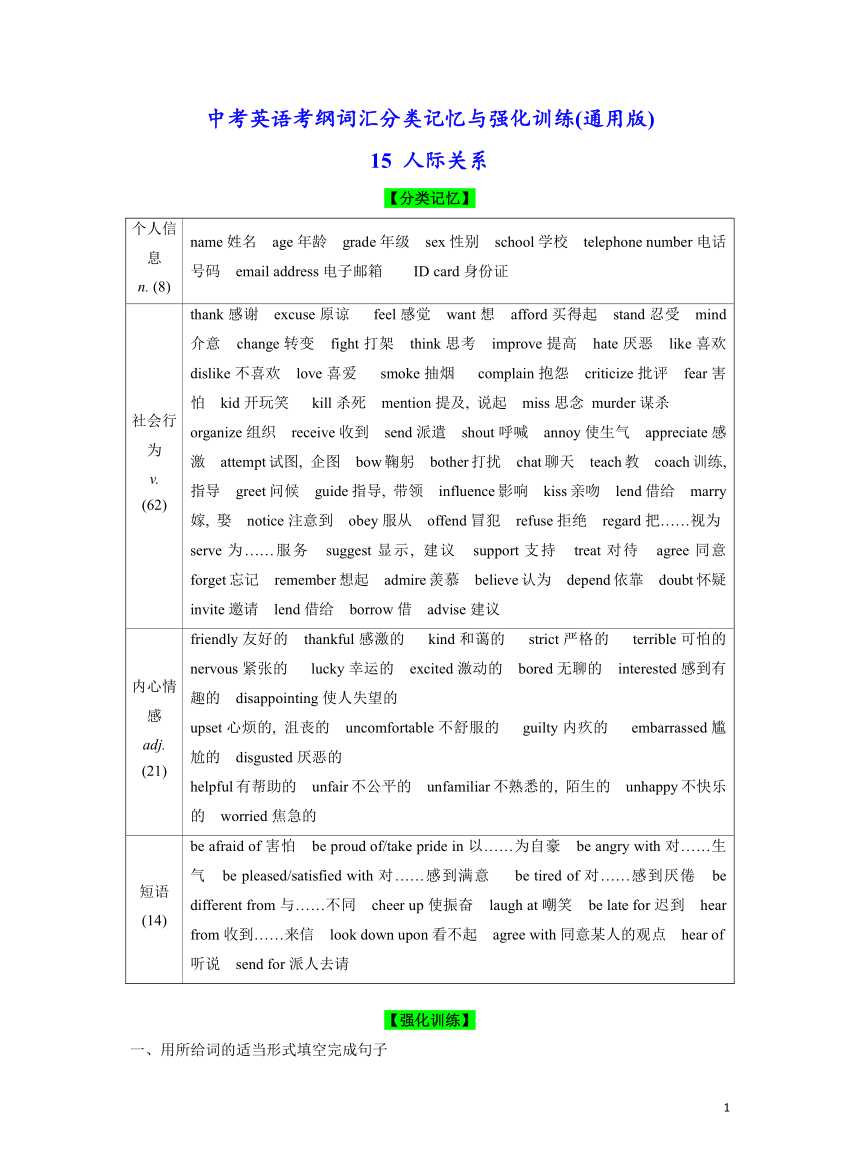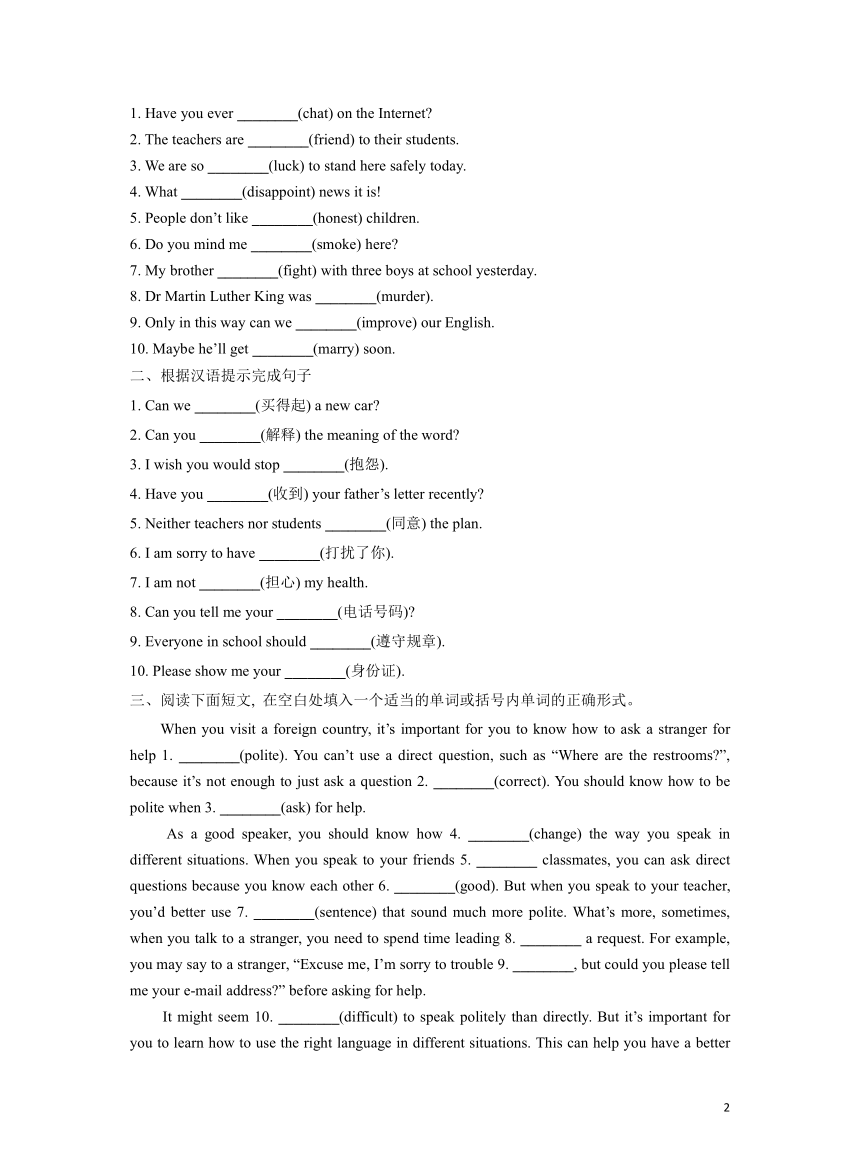分类15 人际关系-2023年中考英语考纲词汇分类记忆与强化训练(含答案)
文档属性
| 名称 | 分类15 人际关系-2023年中考英语考纲词汇分类记忆与强化训练(含答案) |

|
|
| 格式 | doc | ||
| 文件大小 | 35.0KB | ||
| 资源类型 | 教案 | ||
| 版本资源 | 人教新目标(Go for it)版 | ||
| 科目 | 英语 | ||
| 更新时间 | 2023-04-27 10:03:40 | ||
图片预览


文档简介
中考英语考纲词汇分类记忆与强化训练(通用版)
15 人际关系
【分类记忆】
个人信息n. (8) name姓名 age年龄 grade年级 sex性别 school学校 telephone number电话号码 email address电子邮箱 ID card身份证
社会行为v. (62) thank感谢 excuse原谅 feel感觉 want想 afford买得起 stand忍受 mind介意 change转变 fight打架 think思考 improve提高 hate厌恶 like喜欢 dislike不喜欢 love喜爱 smoke抽烟 complain抱怨 criticize批评 fear害怕 kid开玩笑 kill杀死 mention提及, 说起 miss思念 murder谋杀organize组织 receive收到 send派遣 shout呼喊 annoy使生气 appreciate感激 attempt试图, 企图 bow鞠躬 bother打扰 chat聊天 teach教 coach训练, 指导 greet问候 guide指导, 带领 influence影响 kiss亲吻 lend借给 marry嫁, 娶 notice注意到 obey服从 offend冒犯 refuse拒绝 regard把……视为serve为……服务 suggest显示, 建议 support支持 treat对待 agree同意 forget忘记 remember想起 admire羡慕 believe认为 depend依靠 doubt怀疑 invite邀请 lend借给 borrow借 advise建议
内心情感adj. (21) friendly友好的 thankful感激的 kind和蔼的 strict严格的 terrible可怕的 nervous紧张的 lucky幸运的 excited激动的 bored无聊的 interested感到有趣的 disappointing使人失望的 upset心烦的, 沮丧的 uncomfortable不舒服的 guilty内疚的 embarrassed尴尬的 disgusted厌恶的helpful有帮助的 unfair不公平的 unfamiliar不熟悉的, 陌生的 unhappy不快乐的 worried焦急的
短语(14) be afraid of害怕 be proud of/take pride in以……为自豪 be angry with对……生气 be pleased/satisfied with对……感到满意 be tired of对……感到厌倦 be different from与……不同 cheer up使振奋 laugh at嘲笑 be late for迟到 hear from收到……来信 look down upon看不起 agree with同意某人的观点 hear of听说 send for派人去请
【强化训练】
一、用所给词的适当形式填空完成句子
1. Have you ever ________(chat) on the Internet
2. The teachers are ________(friend) to their students.
3. We are so ________(luck) to stand here safely today.
4. What ________(disappoint) news it is!
5. People don’t like ________(honest) children.
6. Do you mind me ________(smoke) here
7. My brother ________(fight) with three boys at school yesterday.
8. Dr Martin Luther King was ________(murder).
9. Only in this way can we ________(improve) our English.
10. Maybe he’ll get ________(marry) soon.
二、根据汉语提示完成句子
1. Can we ________(买得起) a new car
2. Can you ________(解释) the meaning of the word
3. I wish you would stop ________(抱怨).
4. Have you ________(收到) your father’s letter recently
5. Neither teachers nor students ________(同意) the plan.
6. I am sorry to have ________(打扰了你).
7. I am not ________(担心) my health.
8. Can you tell me your ________(电话号码)
9. Everyone in school should ________(遵守规章).
10. Please show me your ________(身份证).
三、阅读下面短文, 在空白处填入一个适当的单词或括号内单词的正确形式。
When you visit a foreign country, it’s important for you to know how to ask a stranger for help 1. ________(polite). You can’t use a direct question, such as “Where are the restrooms ”, because it’s not enough to just ask a question 2. ________(correct). You should know how to be polite when 3. ________(ask) for help.
As a good speaker, you should know how 4. ________(change) the way you speak in different situations. When you speak to your friends 5. ________ classmates, you can ask direct questions because you know each other 6. ________(good). But when you speak to your teacher, you’d better use 7. ________(sentence) that sound much more polite. What’s more, sometimes, when you talk to a stranger, you need to spend time leading 8. ________ a request. For example, you may say to a stranger, “Excuse me, I’m sorry to trouble 9. ________, but could you please tell me your e-mail address ” before asking for help.
It might seem 10. ________(difficult) to speak politely than directly. But it’s important for you to learn how to use the right language in different situations. This can help you have a better communication with others.
参考答案
一、1. Have you ever chatted (chat) on the Internet
2. The teachers are friendly (friend) to their students.
3. We are so lucky (luck) to stand here safely today.
4. What disappointing (disappoint) news it is!
5. People don’t like dishonest (honest) children.
6. Do you mind me smoking (smoke) here
7. My brother fought (fight) with three boys at school yesterday.
8. Dr Martin Luther King was murdered (murder).
9. Only in this way can we improve (improve) our English.
10. Maybe he’ll get married (marry) soon.
二、1. Can we afford (买得起) a new car
2. Can you explain (解释) the meaning of the word
3. I wish you would stop complaining (抱怨).
4. Have you received (收到) your father’s letter recently
5. Neither teachers nor students agree with (同意) the plan.
6. I am sorry to have bothered you (打扰了你).
7. I am not worried about (担心) my health.
8. Can you tell me your telephone number (电话号码)
9. Everyone in school should obey the rules (遵守规章).
10. Please show me your ID card (身份证).
三、
When you visit a foreign country, it’s important for you to know how to ask a stranger for help 1. politely (polite). You can’t use a direct question, such as “Where are the restrooms ”, because it’s not enough to just ask a question 2. correctly (correct). You should know how to be polite when 3. asking (ask) for help.
As a good speaker, you should know how 4. to change (change) the way you speak in different situations. When you speak to your friends 5. or classmates, you can ask direct questions because you know each other 6. well (good). But when you speak to your teacher, you’d better use 7. sentences (sentence) that sound much more polite. What’s more, sometimes, when you talk to a stranger, you need to spend time leading 8. into a request. For example, you may say to a stranger, “Excuse me, I’m sorry to trouble 9. you, but could you please tell me your e-mail address ” before asking for help.
It might seem 10. more difficult (difficult) to speak politely than directly. But it’s important for you to learn how to use the right language in different situations. This can help you have a better communication with others.
1
15 人际关系
【分类记忆】
个人信息n. (8) name姓名 age年龄 grade年级 sex性别 school学校 telephone number电话号码 email address电子邮箱 ID card身份证
社会行为v. (62) thank感谢 excuse原谅 feel感觉 want想 afford买得起 stand忍受 mind介意 change转变 fight打架 think思考 improve提高 hate厌恶 like喜欢 dislike不喜欢 love喜爱 smoke抽烟 complain抱怨 criticize批评 fear害怕 kid开玩笑 kill杀死 mention提及, 说起 miss思念 murder谋杀organize组织 receive收到 send派遣 shout呼喊 annoy使生气 appreciate感激 attempt试图, 企图 bow鞠躬 bother打扰 chat聊天 teach教 coach训练, 指导 greet问候 guide指导, 带领 influence影响 kiss亲吻 lend借给 marry嫁, 娶 notice注意到 obey服从 offend冒犯 refuse拒绝 regard把……视为serve为……服务 suggest显示, 建议 support支持 treat对待 agree同意 forget忘记 remember想起 admire羡慕 believe认为 depend依靠 doubt怀疑 invite邀请 lend借给 borrow借 advise建议
内心情感adj. (21) friendly友好的 thankful感激的 kind和蔼的 strict严格的 terrible可怕的 nervous紧张的 lucky幸运的 excited激动的 bored无聊的 interested感到有趣的 disappointing使人失望的 upset心烦的, 沮丧的 uncomfortable不舒服的 guilty内疚的 embarrassed尴尬的 disgusted厌恶的helpful有帮助的 unfair不公平的 unfamiliar不熟悉的, 陌生的 unhappy不快乐的 worried焦急的
短语(14) be afraid of害怕 be proud of/take pride in以……为自豪 be angry with对……生气 be pleased/satisfied with对……感到满意 be tired of对……感到厌倦 be different from与……不同 cheer up使振奋 laugh at嘲笑 be late for迟到 hear from收到……来信 look down upon看不起 agree with同意某人的观点 hear of听说 send for派人去请
【强化训练】
一、用所给词的适当形式填空完成句子
1. Have you ever ________(chat) on the Internet
2. The teachers are ________(friend) to their students.
3. We are so ________(luck) to stand here safely today.
4. What ________(disappoint) news it is!
5. People don’t like ________(honest) children.
6. Do you mind me ________(smoke) here
7. My brother ________(fight) with three boys at school yesterday.
8. Dr Martin Luther King was ________(murder).
9. Only in this way can we ________(improve) our English.
10. Maybe he’ll get ________(marry) soon.
二、根据汉语提示完成句子
1. Can we ________(买得起) a new car
2. Can you ________(解释) the meaning of the word
3. I wish you would stop ________(抱怨).
4. Have you ________(收到) your father’s letter recently
5. Neither teachers nor students ________(同意) the plan.
6. I am sorry to have ________(打扰了你).
7. I am not ________(担心) my health.
8. Can you tell me your ________(电话号码)
9. Everyone in school should ________(遵守规章).
10. Please show me your ________(身份证).
三、阅读下面短文, 在空白处填入一个适当的单词或括号内单词的正确形式。
When you visit a foreign country, it’s important for you to know how to ask a stranger for help 1. ________(polite). You can’t use a direct question, such as “Where are the restrooms ”, because it’s not enough to just ask a question 2. ________(correct). You should know how to be polite when 3. ________(ask) for help.
As a good speaker, you should know how 4. ________(change) the way you speak in different situations. When you speak to your friends 5. ________ classmates, you can ask direct questions because you know each other 6. ________(good). But when you speak to your teacher, you’d better use 7. ________(sentence) that sound much more polite. What’s more, sometimes, when you talk to a stranger, you need to spend time leading 8. ________ a request. For example, you may say to a stranger, “Excuse me, I’m sorry to trouble 9. ________, but could you please tell me your e-mail address ” before asking for help.
It might seem 10. ________(difficult) to speak politely than directly. But it’s important for you to learn how to use the right language in different situations. This can help you have a better communication with others.
参考答案
一、1. Have you ever chatted (chat) on the Internet
2. The teachers are friendly (friend) to their students.
3. We are so lucky (luck) to stand here safely today.
4. What disappointing (disappoint) news it is!
5. People don’t like dishonest (honest) children.
6. Do you mind me smoking (smoke) here
7. My brother fought (fight) with three boys at school yesterday.
8. Dr Martin Luther King was murdered (murder).
9. Only in this way can we improve (improve) our English.
10. Maybe he’ll get married (marry) soon.
二、1. Can we afford (买得起) a new car
2. Can you explain (解释) the meaning of the word
3. I wish you would stop complaining (抱怨).
4. Have you received (收到) your father’s letter recently
5. Neither teachers nor students agree with (同意) the plan.
6. I am sorry to have bothered you (打扰了你).
7. I am not worried about (担心) my health.
8. Can you tell me your telephone number (电话号码)
9. Everyone in school should obey the rules (遵守规章).
10. Please show me your ID card (身份证).
三、
When you visit a foreign country, it’s important for you to know how to ask a stranger for help 1. politely (polite). You can’t use a direct question, such as “Where are the restrooms ”, because it’s not enough to just ask a question 2. correctly (correct). You should know how to be polite when 3. asking (ask) for help.
As a good speaker, you should know how 4. to change (change) the way you speak in different situations. When you speak to your friends 5. or classmates, you can ask direct questions because you know each other 6. well (good). But when you speak to your teacher, you’d better use 7. sentences (sentence) that sound much more polite. What’s more, sometimes, when you talk to a stranger, you need to spend time leading 8. into a request. For example, you may say to a stranger, “Excuse me, I’m sorry to trouble 9. you, but could you please tell me your e-mail address ” before asking for help.
It might seem 10. more difficult (difficult) to speak politely than directly. But it’s important for you to learn how to use the right language in different situations. This can help you have a better communication with others.
1
同课章节目录
- 词法
- 名词
- 动词和动词短语
- 动词语态
- 动词时态
- 助动词和情态动词
- 非谓语动词
- 冠词
- 代词
- 数词和量词
- 形容词副词及其比较等级
- 介词和介词短语
- 连词和感叹词
- 构词法
- 相似、相近词比较
- 句法
- 陈述句
- 一般疑问句和否定疑问句
- 特殊疑问句及选择疑问句
- 反意疑问句
- 存在句(There be句型)
- 宾语从句
- 定语从句
- 状语从句
- 主谓一致问题
- 简单句
- 并列句
- 复合句
- 主谓一致
- 主、表语从句
- 名词性从句
- 直接引语和间接引语
- 虚拟语气
- 感叹句
- 强调句
- 倒装句
- 祈使句
- 句子的成分
- 句子的分类
- 题型专区
- 单项选择部分
- 易错题
- 完形填空
- 阅读理解
- 词汇练习
- 听说训练
- 句型转换
- 补全对话
- 短文改错
- 翻译
- 书面表达
- 任务型阅读
- 语法填空
- 其他资料
